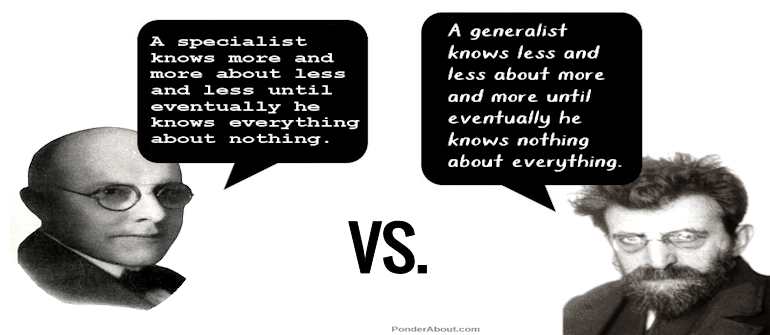
The topic of generalists vs specialists always comes up in PM hiring and strategy conversations. I see PM hiring managers and PM’s themselves struggle with this a lot. What got me thinking about this topic is David Epstein’s new book Range. The core thesis in the book is, and I quote, “Range explains how to maintain the benefits of breadth, diverse experience, interdisciplinary thinking, and delayed concentration in a world that increasingly incentivizes, even demands, hyperspecialization.” So how should you think about this topic? What are the nuances?
From a hiring managers perspective, the superficial understanding of generalists is that generalists are “shallow” in the understanding of things and specialists have that “deep” knowledge. Deeper= better, Deeper = good. Why would you want somebody who has a superficial knowledge of things?
On the other end of the spectrum, PM’s and aspiring PM’s, who don’t have the deep domain experience, naturally position themselves as generalists because they do not have the “deep” experience in a particular domain. When asked why are you a fit for PM, the generalist responses are “I can do anything, I’m a generalist”. This doesn’t translate well to the hiring manager. When you say “I can do anything”, what does that really mean?
One way to think about it is to first separate out the base level competency and the learned competency. For PM’s the base level competency is related to, can they do the work? By work I mean specifically,
- Taking a problem and breaking it down into subproblems
- Understanding the product development process
- Team skills (working as part of a group, communication style, and skill)
- Can do basic arithmetic to measure the things that they ship
The base level competencies don’t require any deep knowledge of the domain they are in. It’s like riding a bike, once you know the mechanics you are set.
Learned competency is where things get interesting. This is the domain-specific knowledge that a person has gained from experience/interest in that domain. If you are working on a fintech product, knowledge of how banks work is the “deep” knowledge. What I’m increasingly convinced is that in the learned competency area, “good” generalists are superior over specialists with a specific definition of what a “good” generalist means.
A good generalist,
- Has the good process/ability to bring themselves up to speed quickly on an industry/vertical/specific problem
- Is adept at reading and absorbing details super quickly, knows how to learn quickly
- Is adept at decomposing the business into its constituent levers and can articulate and connect, in a simple way, initiatives to outcomes that move the constituent levers
So what does any of this have to with 10K’s? 🙂
I let you in a little secret, reading 10k’s is the best way to practice being a good generalist. 10K’s are an absolute goldmine and are the best way to understand everything about a company/industry or sector. As an aspiring PM – devour the 10k of a company that you are interested in applying to. You have a massive leg up over all the competition if you can clearly and succinctly describe their business and the growth levers backed by real numbers from a 10k. If its a private startup, no problem – read up on a public competitor and extrapolate from there what the startup should be thinking about and how they should be thinking about growth levers. For hiring managers, this is a great signal, if the generalist candidate can articulate using third-party sources what you do – hire them!
One Comment